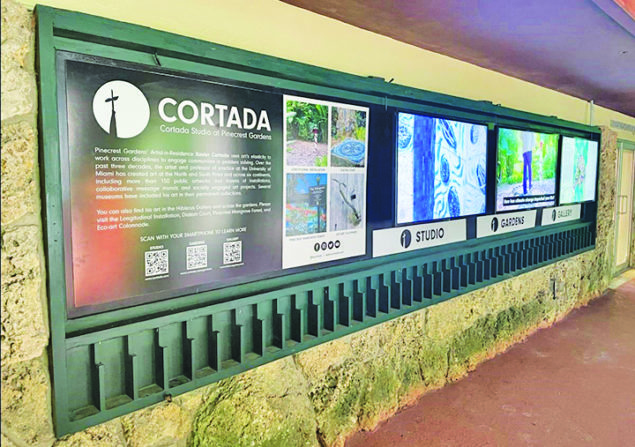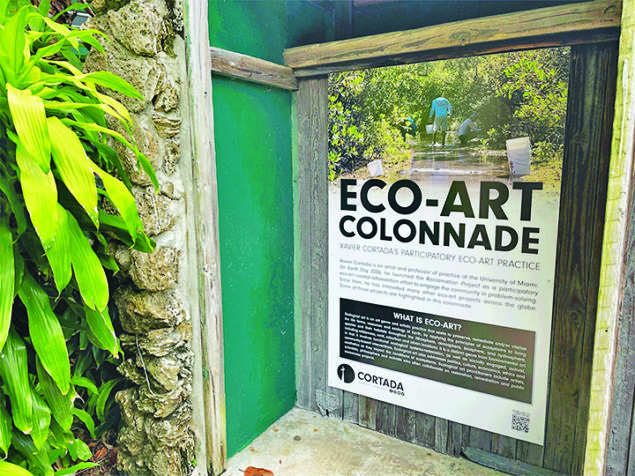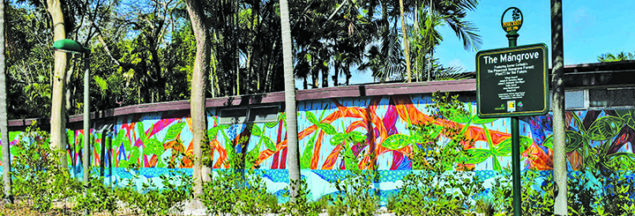|
Getting your Trinity Audio player ready...
|
Xavier Cortada’s participatory art practice is based at Pinecrest Gardens. Through exhibitions at the Hibiscus Gallery, installations along the colonnade in the gardens, and programming at the weekly Farmer’s Market, Cortada Projects uses the power of art to engage the public in learning about and addressing environmental concerns. Cortada’s hope is that by bringing his engaged practice to Pinecrest Gardens, he can raise awareness about pressing environmental issues, encouraging citizens to do what they can to protect the life currently on the planet, as well as the future generations who will inherit what is left behind.
As Pinecrest Gardens’ Artist-in-Residence, Cortada aims to have the community come together through his participatory art projects. By facilitating experiential learning, Cortada Projects allow people to reframe the way they see themselves and their relationship with the natural world. Not only are participants encouraged to explore and become curious about their local environment, but they are motivated to protect and live in tune with nature.
Xavier is an Eco-Artist. Ecological art is an art genre and artistic practice that seeks to preserve, remediate and/or vitalize the life forms, resources and ecology of Earth, by applying the principles of ecosystems to living species and their habitats throughout the lithosphere, atmosphere, biosphere, and hydrosphere, including wilderness, rural, suburban and urban locations. It is a distinct genre from Environmental art in that it involves functional ecological systems-restoration, as well as socially engaged, activist, community-based interventions.
Xavier’s latest installation Eco-art Colonnade, an interactive 200-foot long eco-art exhibition that will be on permanent display at Pinecrest Gardens. The Eco-art Colonnade showcases a collection of Cortada’s most important projects so visitors can learn about critical environmental issues impacting South Florida, participate in a range of ongoing eco-art initiatives, and ultimately discover how they can help to protect people and the planet.
Among the nine featured participatory art projects are the “Underwater HOA” (the internationally renowned effort convening neighbors to plan for sea level rise), “Seahorse Society” (where participants pledge to protect Biscayne Bay and its sea grasses), and “Native Flags” (the urban reforestation campaign that Cortada launched at the North Pole in 2008). Each of the projects along the Colonnade provides an overview of the problem that it attempts to address, the history of the project, and a way for visitors to participate either on-site or at home.
“At a time when our environmental future looks so bleak, it is heartening to share ways in which we can each take individual action to make a difference,” said Cortada. “These participatory eco-art projects aim to inspire and engage our community members to become protagonists in the fight against global climate change and rising seas.”
Since his first participatory eco-art project in 2006, the “Reclamation Project,” Cortada has inspired tens of thousands of people to become curious about the natural world that captivated him as a child. Other featured projects in the Eco-art Colonnade include “Florida is… Nature,” “Endangered World,” “Plan(T),” and “Letters to the Future,” all of which attempt to raise awareness about and motivate action toward the threats of climate change, environmental degradation, and biodiversity loss.
“What a delight it is to learn of the EcoArt Colonnade in Miami’s Pinecrest Gardens Park honoring the outstanding work of Xavier Cortada, one of the first artists in South Florida to engage ecological art as a practice,” said art historian Mary Jo Aagerstoun. “I believe Cortada’s EcoArt continuum will soon outgrow the 200 feet that the upcoming Colonnade will embrace. And so it should.”
The Eco-art Colonnade will serve as a platform for community members, families, and children to have conversations about and commit to protecting Florida’s natural beauty.
Cortada asks visitors to participate in his nine eco-art projects by having them adopt endangered animals, plant native wildflower gardens, pledge eco-actions, mark their homes’ elevation above sea-level, plant salt-tolerant native trees, and write short letters to someone in the future.
According to Cortada, “Working and learning together, we can all problem-solve to make ours a more just, loving and beautiful world.”
We, at Pinecrest Gardens, are so honored to house this extraordinary eco-artist as Artist in Residence domiciled in our gardens and cultural arts park. This innovative, interactive living exhibition is a true gift to our community, to visitors near and far and to those in the future who will benefit from the eco-actions it will generate.
The Eco-art Colonnade will join Cortada’s other public art gems in the garden, including Pinecrest Mangrove Forest (Miami’s first urban mangrove garden), Diatom Court (commemorating FCE LTER scientists who study the Everglades) and the Longitudinal Installation (a replica of the work the artist installed at the South Pole in 2007 to raise awareness of global climate change).
In conjunction with the Eco-art Colonnade is Pinecrest Gardens’ new Digital Corridor, a centralized hub designed to help visitors experience Cortada’s artwork across the gardens, feature artwork that Cortada has created throughout the community, and provide an online gallery of Cortada’s limited-edition prints available in the garden’s Hibiscus Gallery.
Xavier Cortada…a visionary, a Renaissance Man and a Pinecrest Gardens treasure.








